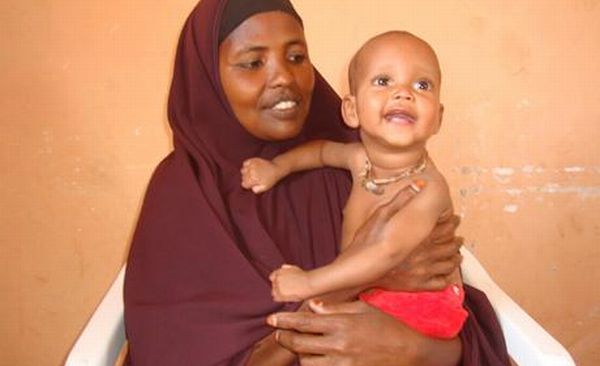
In a land known for sad stories, Oxfam’s working to create one with a happy ending.
Somalia has one of the highest malnutrition rates in the world, with one in seven children below the age of five acutely malnourished and in need of specialised care. Since its start in 2009, our innovative program with local Somalia NGO SAACID has treated more than 136,000 malnourished children and their mothers. This is the story of Mohamed, one of the children who has recovered from severe illness and malnutrition.
“I came here after my son, Mohamed, became very sick about two months ago,” said Fadumo, a 30 year old mother of five in Mogadishu. Less than a year old, Mohamed was suffering from severe diarrhoea, leaving him very frail. “The watery diarrhoea stopped, but he was still thin and weak, and not able to eat or drink anything.”
Clean water and food shortages
Since crippling drought has made clean water in Somalia even scarcer than before, hospitals are seeing a spike in children admitted with severe diarrhoea and malnutrition. With food shortages and little health care available, one of every six children in Somalia dies before they reach the age of five.
“My husband is currently unemployed,” Fadumo continues. With little work available due to the drought and the conflict, Fadumo’s family had no money to seek treatment for Mohamed. “Our life now depends on what my husband’s brothers give us. In fact, it is not enough for us, but it is our only support now.”
Mohamed was drastically underweight for his age, and a community health worker recognised the severity of his condition. “A SAACID outreach lady, who came to my home, told me that there was a center which treats malnourished children in the district,” said Fadumo. “She took me to the center. When I came here, the nurses at the center told me that Mohamed was ailing with malnutrition.”
“When he was admitted to the program he was very thin,” recalls Fadumo, “and I thought that he would never return to his standard weight, because he had stopped eating and drinking.” She adds that when he was only two months old, Mohamed had already refused to be breastfed.
“Since that time, he was sick and he never had good health for even one day.”
Mohamed was admitted to SAACID’s Community Therapeutic Care (CTC), a program implemented along with Oxfam Novib (Netherlands). Although seriously ill when he began treatment, his health improved. “After he began taking the special biscuits, he almost immediately began to eat and drink water and milk again,” Fadumo said.
“A donation of life”
More than 240,000 children under five are malnourished in Somalia, and Mohamed was fortunate that the volunteer brought him into the therapeutic feeding program in time. During a usual course of treatment, severely malnourished children can remain outpatients in the CTC program for up to three months. If they have complications, they are referred to more specialised inpatient centers that provide constant 24-hour care and supervision.
Previously thin and listless, Mohamed began putting on weight as the days passed. He regained energy, and became more active. The young boy even began smiling again. “This health centre is clearly providing lifesaving care, and there is strong support in our neighborhood for it,” Fadumo said. “We all thank SAACID and its donors for this donation of life. We hope SAACID can continue supporting the sick malnourished children.”
After two months in the severely malnourished outpatient program, Mohamed has made great progress. If his improvement continues, he will be released in the coming weeks.
Community-based Therapeutic Care (CTC)
Working with local Somali partner SAACID, and in partnership with other agencies, Oxfam started this community care program in September 2009 to address malnutrition in Mogadishu.
The program aims to treat acutely malnourished children, pregnant and lactating mothers to ensure that they do not fall back into nutritional crisis.
With the exception of interruptions in some of the sites due to supplies and insecurity, the program has been running steadily since its launch without major incidents.
In July 2011 the program expanded from eight to eleven sites, and is now operating across Mogadishu in Yaqshid, Waberi, Karan, Shingani, Wadjir, Dharkanley, Hamar Jajab, Hamar Weyn, Wardhigley, Hawl-wadag and Heliwaa.
The Community-based Therapeutic Care Program includes 240 outreach workers and 40 outreach team leaders who conduct active case finding, case follow up and deliver key health messages on a daily basis across the city. In addition, the CTC team includes 240 community volunteers and approximately 64 support staff that are integral in the running of the program.
As of August 2011, the eleven Community-based Therapeutic Care centers have treated more than 130,000 children and mothers with malnutrition – with 56,000 so far in 2011.
Find out more
See what else we’re doing in East Africa